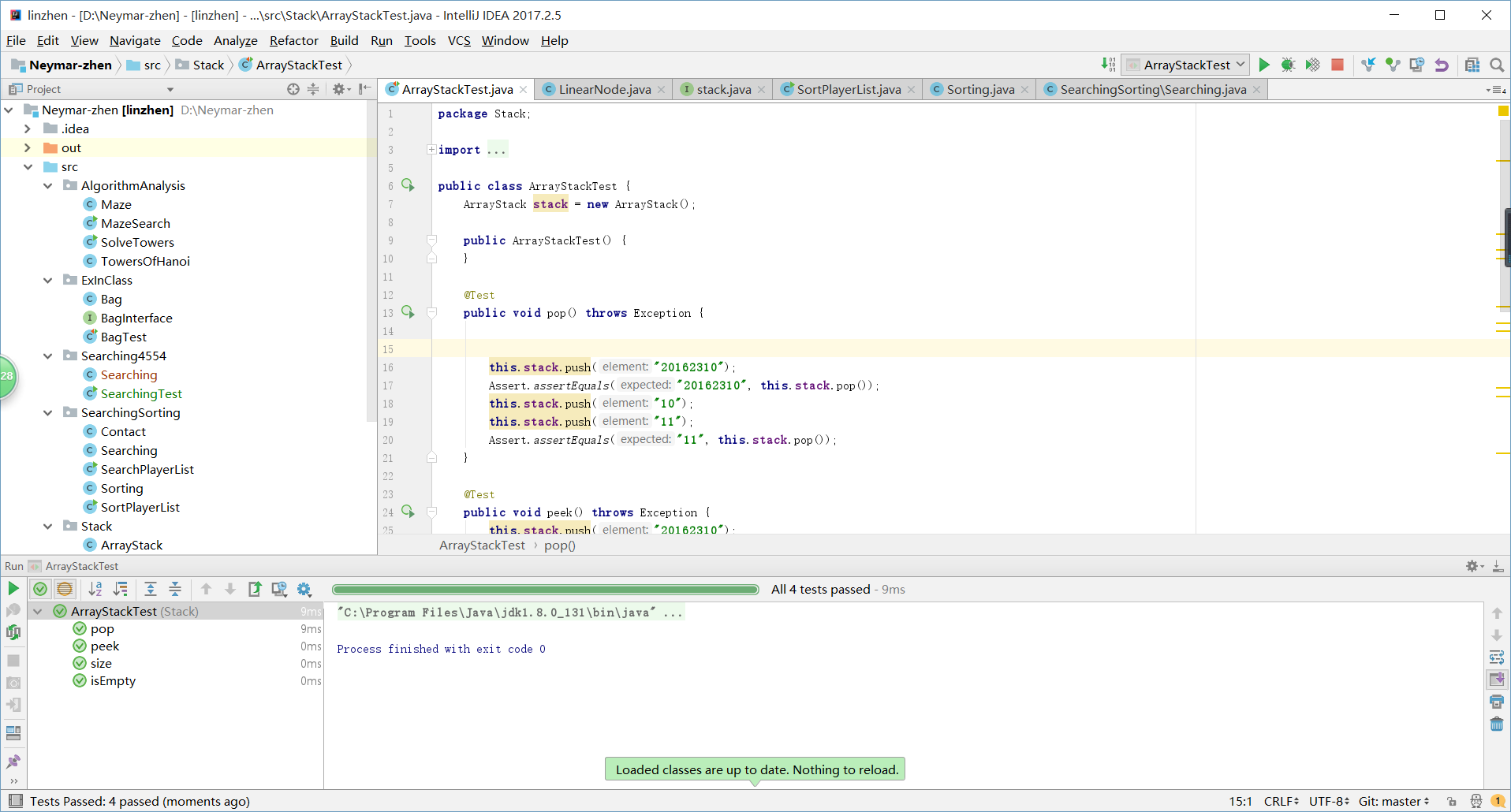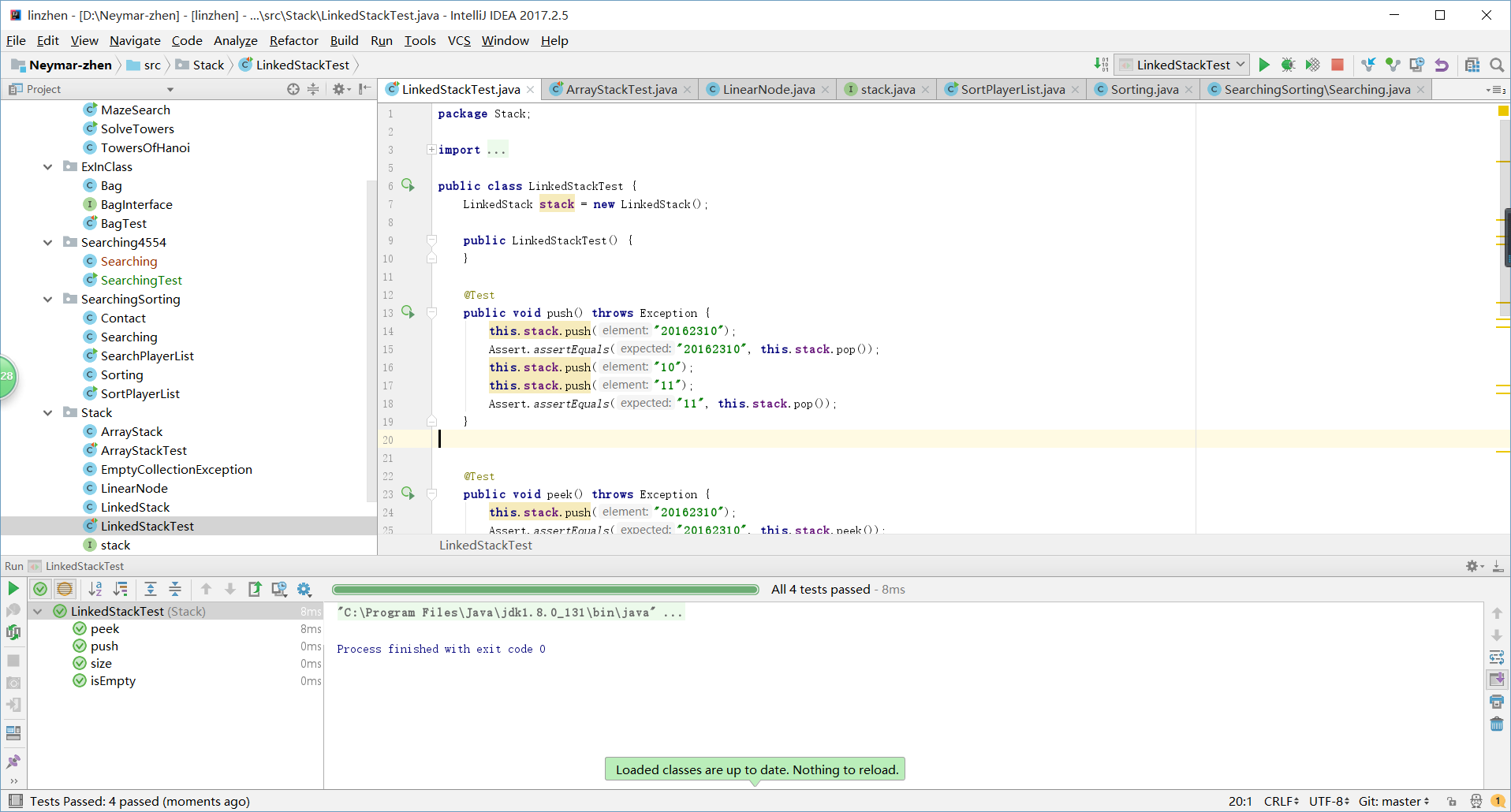第五周作业总结(内含用Junit测试ArrayStack和LinkedStack课堂练习报告)
---恢复内容开始---
# 学号 20162310《程序设计与数据结构》第五周学习总结教材学习内容总结
- 集合分为线性集合(集合中的元素排成一行)和非线性集合(按不同于一行的方式来组织元素,例如按层次或是按网络的方式)。
- 集合中元素之间的组织方式通常由两个因素决定,一、它们加入集合的次序。二、元素之间的固有关系。
- 抽象数据类型(ADT)忽略许多的细节为的是方便控制复杂的系统。
- 栈集合以LIFO的方式处理元素
- 泛型是本章的重点,有
及表示某类某方法某变量为泛型,但有些时候用具体的类来代替 ,从而实例化 - 使用栈来实现计算后缀表达式
- 使用数组或链表来实现栈是本章的练习重点
教材学习中的问题和解决过程
- 问题1:对于使用链表来实现栈还有很多疑问
- 问题1解决方案:相比于数组的简单结构,链表多了一个使用LinearNode
结点类,来指向表中下一个LinearNode 的引用,和指向该结点中保存的元素的引用。每个结点保存一个泛型类型,当实例化结点时才确定其类型。LinearNode 不仅仅在栈中实现,在下一章的队列中也有使用到LinearNode 。
代码调试中的问题和解决过程
- 问题1:在课上练习的用数组实现栈和用链表实现栈没有完成,以下是对这两个项目的详细分析
用数组实现栈,题目:实现ArrayStack,完成peek,isEmpty,size和toString方法,并用Junit测试
public T pop() throws EmptyCollectionException {
if (this.isEmpty()) {
throw new EmptyCollectionException("No elements available");
} else {
T result = this.stack[this.count]; // 设置泛型变量result用来存储pop出来的元素;
this.stack[this.count] = null; // 将原位置的数组位清除元素,设为null;
return result; // 返回pop出来的元素
}
}
public T peek() throws EmptyCollectionException {
if (this.isEmpty()) {
throw new EmptyCollectionException("No elements available");
} else {
return this.stack[this.count - 1]; // 弹出元素但不返回
}
}
public boolean isEmpty() {
return this.count == 0; //另count=0,即空
}
public int size() {
return this.count; //count记录长度,返回count即为长度
}
public String toString() {
String result = "<top of stack>\n"; // 注释栈顶
for(int index = this.count - 1; index >= 0; index--) { //用for循环打印栈中元素
result = result + this.stack[index] + "\n";
}
return result + "<bottom of stack>"; // 注释栈底
}
- 用Junit测试ArrayStack

用链表实现栈,完成LinkedStack,给出size,isEmpty和toString方法的定义,并用Junit测试
public T pop() throws EmptyCollectionException {
if (this.isEmpty()) {
throw new EmptyCollectionException("Pop operattion failed.The stack is empty."); //pop操作的时候若链表为空报出异常
} else {
T result = this.top.getElement();
this.top = this.top.getNext();
this.count--;
return result;
}
}
public void push(T element) {
LinearNode<T> temp = new LinearNode(element);
temp.setNext(this.top);
this.top = temp;
this.count++;
}
public T peek() throws EmptyCollectionException {
if (this.isEmpty()) {
throw new EmptyCollectionException("Pop operattion failed.The stack is empty.");
} else {
return this.top.getElement();
}
}
public boolean isEmpty() {
return this.count == 0;
}
public int size() {
return this.count;
}
public String toString() {
String result = "";
for(LinearNode current = this.top; current != null; current = current.getNext()) {
result = result + current.getElement().toString() + "\n";
}
return result;
}
- 结点类LinearNode
public class LinearNode<T> {
private LinearNode<T> next = null;
private T element;
public LinearNode() {
this.element = null;
}
public LinearNode(T elem) {
this.element = elem;
}
public LinearNode<T> getNext() {
return this.next;
}
public void setNext(LinearNode<T> node) {
this.next = node;
}
public T getElement() {
return this.element;
}
public void setElement(T elem) {
this.element = elem;
}
}
- 用Junit测试LinkedStack

上周考试错题总结
本周结对学习情况
- [20162314](博客链接)
- 结对照片
- 结对学习内容
学习进度条
| 代码行数(新增/累积) | 博客量(新增/累积) | 学习时间(新增/累积) | 重要成长 | |
|---|---|---|---|---|
| 目标 | 5000行 | 30篇 | 400小时 | |
| 第一周 | 200/200 | 1/1 | 20/20 | |
| 第二周 | 200/200 | 1/1 | 20/20 | |
| 第三周 | 200/200 | 1/1 | 22/22 | |
| 第四周 | 1000/1000 | 1/1 | 30/30 | |
| 第五周 | 1000/1000 | 1/1 | 22/22 |




【推荐】编程新体验,更懂你的AI,立即体验豆包MarsCode编程助手
【推荐】凌霞软件回馈社区,博客园 & 1Panel & Halo 联合会员上线
【推荐】抖音旗下AI助手豆包,你的智能百科全书,全免费不限次数
【推荐】轻量又高性能的 SSH 工具 IShell:AI 加持,快人一步
· 深入理解 Mybatis 分库分表执行原理
· 如何打造一个高并发系统?
· .NET Core GC压缩(compact_phase)底层原理浅谈
· 现代计算机视觉入门之:什么是图片特征编码
· .NET 9 new features-C#13新的锁类型和语义
· Spring AI + Ollama 实现 deepseek-r1 的API服务和调用
· 《HelloGitHub》第 106 期
· 数据库服务器 SQL Server 版本升级公告
· 深入理解Mybatis分库分表执行原理
· 使用 Dify + LLM 构建精确任务处理应用